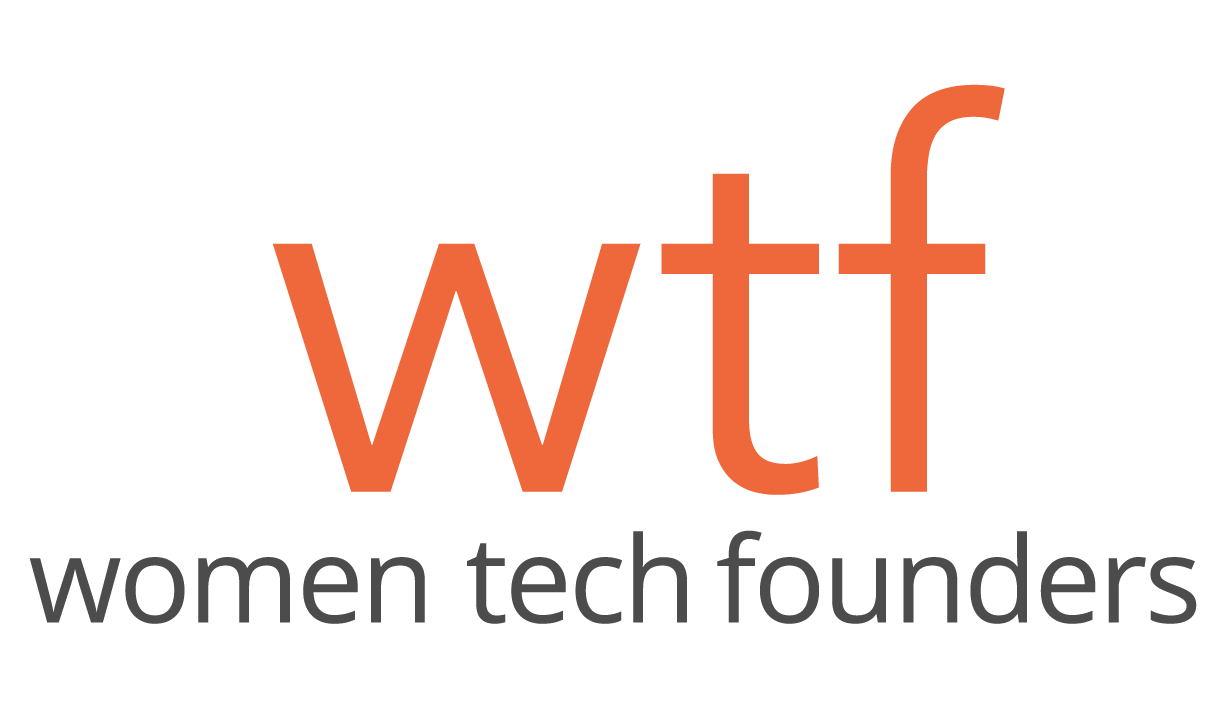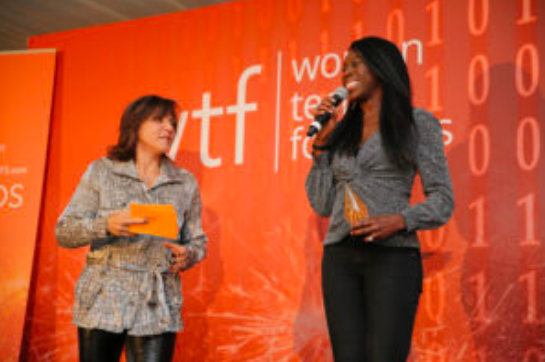Meet Feyi Olopade Ayodele, our 2019 Health & Biotech Award winner and CEO and founder of CancerIQ, a healthcare technology startup that helps providers use genetic information to predict, pre-empt, and prevent disease, starting with cancer.
Women Tech Founders CEO, Terri Brax, and Propllr’s Julianna Marchant sat down with Feyi to hear how she built a healthcare technology startup that’s changing the way we diagnose cancer, and how she motivates her team through a sense of shared purpose.
Searching for Social Impact: From Investment Banking to Her Mother’s Oncology Practice
Back when Feyi Olopade Ayodele graduated from college at the Wharton School of Business, she knew she wanted to pursue a career in social impact. But first, she took a job in investment banking.
Feyi knew that in order to sustainably build and scale her own social impact venture one day, she’d need hands-on experience in the finance world first. That way, once it came time to bid for venture capital and manage a small business, she’d know exactly what it would take to meet social impact goals.
Lesson #1: Gain expertise and operational experience in a relevant sector before launching your venture.
“I didn’t have any operational experience doing anything. I realized the best way to fulfill my impact venture goals would be to delay the time of founding and get expertise in a real sector.”
After several years in investment banking, Feyi returned to Wharton for her MBA, where she started to weave together her finance knowledge with impact investing. For two years she managed the Wharton Social Venture Fund, a student-led VC and angel investing program. She got plenty of exposure investing in early stage businesses in sectors like clean energy, healthcare, and education technology.
Feyi knew she wanted to continue working in impact ventures after completing her MBA, but she had also just secured a job at McKinsey. She deferred her position and decided to work for her mother to figure out what she wanted to do. Her mom, Dr. Olufunmilayo Olopade, just happened to be a MacArthur Genius Grant-winning oncologist at the University of Chicago.
Feyi says, “Of course I knew that my mother was doing amazing work in breast cancer research, but I didn’t know what that meant. I didn’t know what her work looked like on the ground, and it was very eye-opening to see it in clinical practice.”
Feyi dug deeper into the pain points in healthcare technology as a project manager at UChicago’s Center for Clinical Cancer Genetics. In financial services, there’s a software solution for everything. At the cutting edge of healthcare, on the other hand, Feyi noticed that everything was still unbelievably manual. UChicago had a well-run cancer prevention technology that could save lives, but the system wasn’t replicable outside of this program.
Feyi recognized her challenge and found a new goal. “I believed that my mother’s genetic detection and prevention research needed to be widely accessible, so I had to find a way to bring it to clinics and hospitals all over the country. To truly be able to scale what I saw as the future, I needed to process what I observed and develop a solution for womens’ health practices everywhere.”
Feyi knew she had to do her homework in order to figure out how to build the product, so she interviewed as many people as possible at the UChicago program.
Then, the pieces started falling into place: she asked her mother to serve as a co-founder and Chief Scientific Advisor to the venture. She was already managing ten university employees, including four Booth MBAs, which meant her team was in place. The more people she spoke with about her business plan, the more she was told it was a great idea, which gave her confidence.
Feyi turned down her offer from McKinsey and launched her spin-off venture, CancerIQ.
Securing Community Support, Venture Capital, and Human Capital
In the early stages of CancerIQ, Feyi sought out networks that would give her the support and encouragement she needed to get her venture moving. UChicago was an excellent institutional resource, but she needed to start making connections in the startup community.
Lesson #2: Find a community that pushes you forward.
First, Feyi joined Chicago startup accelerator 1871. “The 1871 community made me work harder,” she says. “You shouldn’t be alone to start a company – you need people to hold you accountable. I got a seat there, and I used the energy of that community to keep going.”
“You shouldn’t be alone to start a company – you need people to hold you accountable.”
Next, Feyi flew to San Francisco to accept a fellowship position with Rock Health, a seed fund that supports startups in healthcare technology. Feyi notes that building relationships with other founders in the healthcare tech space was foundational: “Rock Health was a real community. I met a group of founders in healthcare that I could lean on. They helped me with contracts, and when we were in the concept stage, they’d all been through the same experience and had great advice for me.”
Feyi wanted to bring that community ethos she found in San Francisco back with her. When she returned to Chicago, she says the culture of sharing was even stronger in Chicago’s healthcare startup scene. She joined MATTER, a healthcare startup incubator, and was eager to share what she had learned with that community.
Lesson #3: Be overprepared and have numbers to show when it’s time for funding. The cards are stacked against you as a woman of color, but investors can’t turn down great numbers.
After CancerIQ’s concepting stage, it was time to put Feyi’s years of finance experience to the test: she needed capital.
She was well aware of how rare and challenging it is for women, especially Black women, to secure funding. According to ProjectDiane, even as the number of Black women-led startups has more than doubled since 2016, the amount of venture and angel funding they’ve received since 2009 is still just .0006% of the total $424.7 billion raised in the same period.
The first round of pre-seed funding, Feyi says, was the easiest. “The first round of capital is just about telling a convincing story about your idea. That part was natural for us: friends and family wanted to support two black women launching an innovative healthcare technology solution.”
Things got harder with real investors, though. Feyi kept her eyes on the prize and focused on getting traction and hitting milestones first. “My seed round was really about financing a company to get to product-market fit. I was selling a solution before I built it. I had a first customer and a first contract before embarking on development.”
Feyi says that the goal post for female founders keeps moving further and further away. Even when a company is generating millions of dollars in revenue a year, investors really only care about taking a business to the next level. “There’s a bias against female founders’ pitches. For female founders, there’s a higher burden of proof in vying for venture capital.”
“For female founders, there’s a higher burden of proof in vying for venture capital.”
Feyi’s biggest piece of advice for women seeking venture capital for their businesses is to be prepared. “You hear stories of someone coming up with an idea, putting together a great pitch deck, and walking out of the door with funding. That’s not how it works. Be overprepared. Know your numbers. If they’re not good, work on making them better. Don’t waste your time fundraising.”
Lesson #4: Your people are everything. Invest in your human capital.
Feyi acknowledges that one of the hardest parts of growing CancerIQ was finding and scaling a team that’s in it for the long haul. “I’ve raised capital for companies before, but I had never built a team. A team that wants to work for you when you’re just starting out is very different from a team for when you have 60 hospital clients and generate millions of dollars in revenue.”
“Human capital is easy when you’re tiny, but it’s more critical that you make the right hiring decisions later on to maintain momentum.”
To assemble a team that will help you move your business forward, you need a formal screening process to find people whose goals align with your own. Ask yourself: how will this person be a culture add in addition to a value add?
For a company driven by a shared goal of improving health outcomes, it’s essential to find people that are motivated to put in the hard work to get there.
“People need to scale themselves as a CEO and founder – the challenges of a startup are different at each stage, and that’s especially true for managing your team.”
Feyi says she reached a tipping point in her hiring strategy when she turned 30. “I started this business in my 20s. Early on, I was focused on finding people like me. The ideal fit was someone young like me who wanted to learn and figure things out on their own. Now, I think a smarter strategy for founders is to think less about finding people like you and instead find more experienced candidates who will bring expertise to your organization. That way, you can be really good at your job instead of being really mediocre at everyone else’s job.”
Scaling a Purpose-Driven Business
Lesson #5: Find a goal that inspires everyone in your company to work hard for.
Today, CancerIQ has raised over $5 million in venture capital, developed and launched a commercial product, and scaled its user base to over 40 health systems.
The one metric Feyi cares about most of all, though, is patient impact, and she has a new goal: treat one million patients. The key to getting there, she says, is having a goal that inspires everyone in your company to work toward.
Feyi speaks excitedly about what’s next for CancerIQ in 2020: “We want to be on pace to treat one million patients a year. I remember when we hit 50 thousand, 100 thousand – but now, one million really feels like we have a great product that’s changing people’s lives. I think this goal is an incredible motivator for our team. It puts our work into context every day and reminds us why we do it.”
“When you have a people-oriented goal, or impact goal, it’s a lot more inspiring for your team to work toward.”
Planning ahead, talent is key to fulfilling CancerIQ’s future goals. Feyi asks herself, “What can I do to get better talent? Keep your eyes wide open and go for the people you’d never think would work for you. People who are both experienced and passionate to join your team is what propels you to keep growing. I think about talent every day. Your company is your people. They need to be great.”
Feyi is also optimistic about the female future of investing and startup ventures. She believes women like herself are carving a path for even more women to win funding and start companies: “Having female angel investors will make a difference. I think I appeal to female investors who think the way I do to spread the wealth. There just need to be even more female gatekeepers out there giving other women the benefit of the doubt and the affirmation they need to keep working.”

